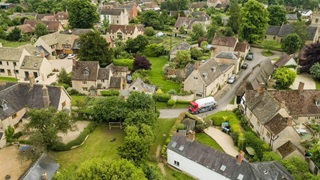What energy challenges lie ahead for rural homeowners?
- What you need to know
- What is decarbonsation?
- How does decarbonsation effect rural homeowners?
- Challenges for rural homeowners
- How Calor can help
- Building a more sustainable future
Today, many of us are more aware of our environmental footprint than ever before. In order to prevent further damage to the environment and combat climate change, targets have been set by the UK government to significantly reduce carbon emissions.
In fact, the UK government set a precedent when it announced its ambitious plan for net-zero emissions by 2050. Among these plans was the Heat and Buildings Strategy, which aims to help us decarbonise our homes.
The government’s strategy includes a pledge of £3.9 billion in government funding to help householders with their decarbonising efforts; this includes a boiler upgrade support scheme that was launched in April.
What is decarbonisation?
Decarbonisation is about reducing CO2 emissions that are a result of human activity. Did you know nearly a fifth of the UK’s total greenhouse gases come from heating buildings? Replacing fossil fuels such as oil – which emit higher levels of CO2 – with a lower-carbon source is essential to help combat climate change.
How does decarbonisation affect rural homeowners?
The government outlined plans to start the decarbonisation process with homes that aren’t on the gas grid, such as those in rural locations. They aim to bring in new regulations, taking effect from 2026, which will see an end to carbon-emitting fuels in off-grid homes by the late 2030s. Thankfully, there’s time for rural homeowners to think about more environmentally friendly alternatives.
The Climate Action Plan may place emphasis on heat pumps as the sole replacements for high carbon heating systems – but this alternative can be impractical and unaffordable for some rural homeowners.
Even with the new government grant to reduce heat pump costs, it can still cost a significant amount – but there are other sustainable solutions to consider.
Challenges for rural homeowners
Rural areas are not all the same, so the route to zero carbon may differ depending on where you live. Off-grid homes don’t have access to the main gas supply and can often be under-insulated, which means homeowners should carefully consider their energy options.
Better-insulated buildings might seem like a simple solution for rural homeowners – but this can often be an issue for older rural buildings, where initial costs can be very high.
LPG boilers are a great option for off-grid homes, offering an alternative to heating fuels like electricity or oil – and for those looking toward the future, LPG boilers are also compatible with bio-fuels like BioLPG, a more sustainable twist on LPG made from a blend of waste, residues and sustainably sourced materials.
How Calor can help
There is a solution at hand for rural homeowners – simply switching from oil to LPG with Calor Home Energy.
At Calor, we’re working with the Department for Business, Energy and Industrial Strategy (BEIS) to help them understand the complex needs of the off-grid heating market and discussing the role of BioLPG within the government’s new Heat and Buildings Strategy.
Calor's BioLPG is made from sustainably sourced materials and is a like-for-like replacement for LPG – the same great performance, but with a lower carbon footprint.
We have invested in new UK facilities to produce sustainable fuels, so our customers are in good hands as the changes start to come into play as we continue our focus on more sustainable energy.
Building a more sustainable future
The benefits of more efficient, low-carbon energy solutions for consumers are clear; smarter, better performing buildings, reduced energy bills and less impact on the environment.
You may not have considered switching from oil to LPG, and might be unsure if LPG is a suitable solution for your home – but you needn’t worry about having to replace your entire heating system, as LPG boilers can often be fitted into existing oil-run systems.* It’s simple to find Gas Safe registered LPG Boiler Installers, too.
Do you want to learn more about decarbonising your home by switching from oil to LPG? Find out more here, and hear from a homeowner who’s done just that here.
Interested in learning more about BioLPG, an even more sustainable twist on LPG, now available for homeowners? Find out more here.
*Your local LPG heating engineer will be able to tell you if your existing heating system can remain.

 }
}
 }
}
 }
}
 }
}
 }
}
 }
}
 }
}
 }
}